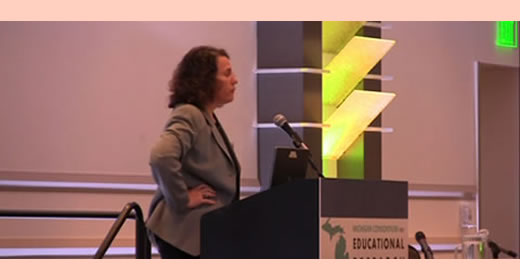
The Obama Administration implements Susan Dynarski's research on financial aid
Stretched family incomes, fewer private sources of credit, and rising tuition costs–while still a key predictor of lifetime earnings, a college education has become harder than ever to afford. Ford School economist Susan Dynarski's research has focused on ways to close the racial and socioeconomic gaps in college entry, particularly around one key factor: federal financial aid. Now Dynarski's work is in the hands of the policymakers who can put her recommendations into practice.
The Obama Administration sees access to higher education as both an equity issue and a means of building a skilled workforce prepared for the economy's rebound. In June, U.S. Secretary of Education Arnie Duncan announced significant changes to the form college students use to apply for federal financial aid, the much-maligned Free Application for Federal Student Aid, or FAFSA.
The results? A shorter, simpler online application form; proposed legislation to remove more than half of the financial questions; the ability for some families to re-use financial data already submitted to the IRS; and ultimately, one fewer barrier to a college education.
Secretary Duncan's announcement was the culmination of a long process of policy engagement by Dynarski and other academic researchers. In 2006, Dynarski and her co-author, Judith Scott-Clayton, set out to conduct high-quality, nonpartisan research on the costs and benefits of the complex process of applying for federal financial aid. The researchers concluded that with very little loss of accuracy, the application process could be reduced to a simple checkbox on tax returns, indicating the desire to apply for financial aid. Information already collected by the IRS could then be used by the Department of Education to evaluate eligibility.
Reduced complexity would also help families by enabling the Department to communicate financial aid decisions earlier in the process, when the information could more meaningfully help students make the decision to apply to college. Dynarski and Scott-Clayton asserted that this set of reforms would "improve the effectiveness of the billions already committed to higher education, allowing aid to serve its intended goal: opening college doors to those with the ability but not the means to pursue higher education."
In 2007, the Brookings-based Hamilton Project commissioned a nontechnical, policy-oriented version of the original research papers. The resulting publication, "College Aid on a Postcard," was widely picked up by the mainstream press and specialty publications such as The Chronicle of Higher Education. Dynarski testified before Congress, participated in countless conference calls with policymakers, and met with financial aid administrators from around the country. Several presidential hopefuls-Republicans as well as Democrats-incorporated the ideas into their platforms. Dynarski was invited to join the Rethinking Student Aid Study Group, sponsored by the College Board, and they included her recommendations in an influential publication last fall.
Co-chaired by Sandy Baum, a senior policy analyst for the College Board and professor of economics at Skidmore College, the Study Group assembled some of the most prominent experts on higher education finance in the country. Baum praised Dynarski's contributions, noting that in its deliberations, "the group relied heavily on Susan's research and her expertise, especially on the issue of simplifying the application process for student aid. The respect with which the report has been received has been significantly enhanced by Professor Dynarski's reputation and her role."
